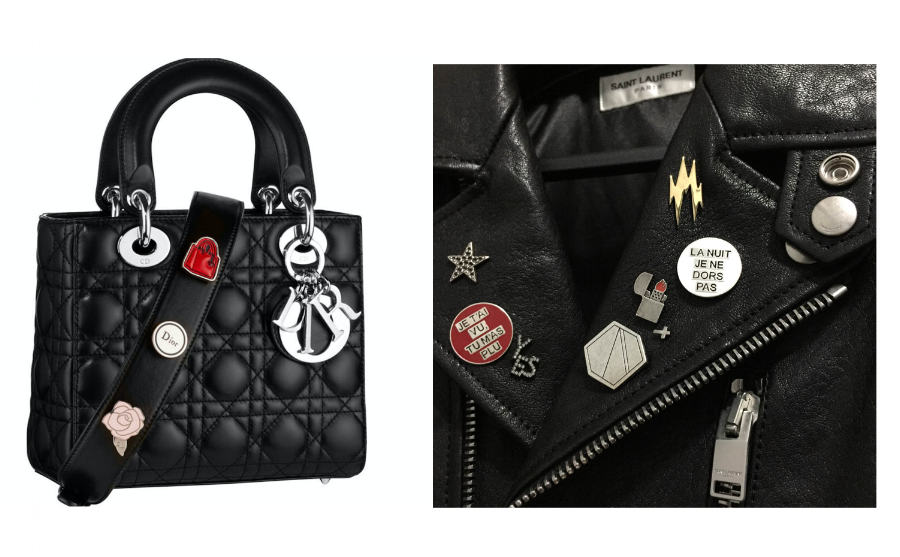
images; Dior, YSL
In the midst of the hazy lull of summer of 2016, Zara was hit with a massive social media shaming campaign. Led by indie artist Tuesday Bassen, Zara was blasted for blatantly copying nearly 50 different enamel pin designs from an array of indie designers. The Spanish fast fashion giant had taken to covering many of its garments with small enamel pins, one of fashion’s “it” accessories at the time. It was not long after Kim Kardashian started stocking pins on her Kimoji e-commerce site, Dior began affixing pins to its Lady Dior bag straps and Saint Laurent took to covering its moto jackets with an array of pins.
Zara compounded artists and consumers’ fury when it responded to then 26-year old Bassen’s concerns, arguing that Bassen’s work was “too simple” to protect and that the designs, themselves, are not attributable to her (i.e., no one would know any of the pins were Bassen’s work).
Since then, the enamel pin has become one of the more contentious accessories in the fashion industry. More mass market retailers, including Walmart-owned Mod-Cloth, have been called out for copying on social media, and in some instances, these claims of copying escalated off of the web and into court. For example, late last year, indie artists Katie Thierjung, Laser Kitten, and Wildflower Co. filed suit against Marc Jacobs for “intentionally and knowingly” copying their original pin and patch designs for its June 2017 pre-season collection.
The plaintiffs asserted that despite sending Marc Jacobs – “one of the most recognizable fashion brands in the world” – a cease and desist letter alerting the brand to the allegedly infringing pins, the brand not only “continued marketing and selling its Resort 2017 collection [pins and patches included],” the New York-based brand introduced “numerous additional infringing products, which it incorporated into its Spring 2017 collection, a successor to the Resort 2017 collection.”
That lawsuit – which is still underway in federal court in New York – was followed up by another infringement suit, in which 11 indie artists came together to file a copyright and trade dress infringement suit against Francesca’s Collections, alleging that the American retailer had sold enamel pins that were blatant replicas of their own original designs.
Andrew Gerber of Kushnirsky Gerber PLLC, counsel for the 11 plaintiff artists, said at the time: “This is just a first step for us in a larger enforcement effort. Pins and patches have risen in popularity lately, and unlawful copying has risen, as well. We’re fighting back on behalf of independent artists.”
And Gerber is making good on his word. On Wednesday, he filed another copyright infringement lawsuit, this time on behalf of Sara M. Lyons, an independent artist “known for her irreverent interpretations of symbols of contemporary culture” against Lord & Taylor.

Lyons’ pin design (left) and Lord & Taylor’s version (right)
According to Lyons’ complaint, which was filed in federal court in New York, Lord & Taylor – “one of the largest department store retailers in the country” – has been selling garments bearing one of Lyons’ “most iconic designs,” her copyright-protected “Whatever Forever” graphic, since the fall of 2017. Despite alerting Lord & Taylor to the infringing products, the upscale department store “continued to sell the infringing product in its stores and via its website … an act of willful, intentional, and purposeful [infringement] in reckless disregard of and with indifference to” Lyons’ rights.
Lyons is seeking monetary damages, including “actual damages in connection with [Lord & Taylor’s] willful copyright infringement,” as well as “statutory damages, attorneys’ fees, and costs under the Copyright Act.”
While copyright law has traditionally proven a complicated – and largely fruitless – avenue for protecting most fashion designs in the U.S. (in large part because copyright law does not protect useful articles, such as garments), jewelry and enamel pins often prove easily protectable items. With that in mind, as luxury brands and fast fashion retailers, alike, continue to affix others’ pin designs to their garments and accessories, these small adornments are taking center stage in an increasing number of lawsuits in a big way.







